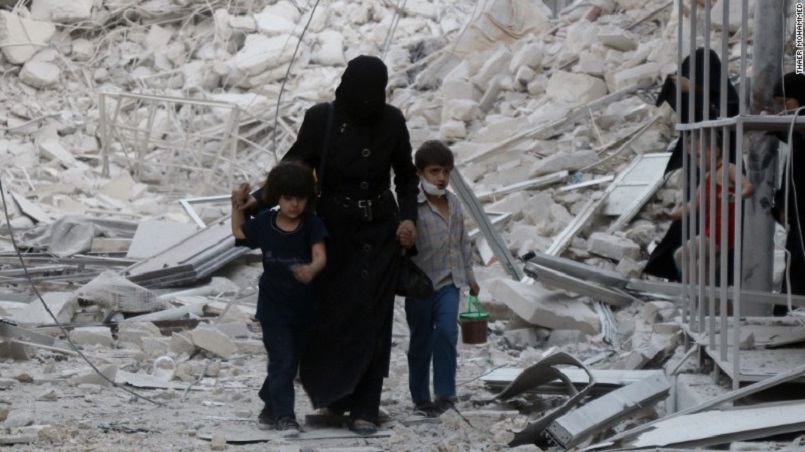
A brief, unilateral ceasefire effectively ended on Sunday with the resumption of airstrikes against the besieged, rebel-held portion of eastern Aleppo.
Residents said warplanes began bombing the city in the latter half of Sunday.
"The bombing started again," a Syrian White Helmet rescue worker named Ismail Abdullah told CNN by phone from eastern Aleppo.
"I heard a lot of bombing in the night. They were airstrikes."
Civilians urged to evacuate
The Syrian government and its close ally Russia announced the start of the ceasefire last Tuesday.
Originally, it was only expected to last eight hours, but ended up stretching several days.
During that time, the Russian military announced the establishment of several "humanitarian corridors." Aircraft dropped thousands of leaflets over eastern Aleppo, urging civilians to evacuate.
A Russian government website posted what were described as live video feeds of checkpoints at the humanitarian corridors. However, few -- if any -- of the tens of thousands of people believed to be trapped in eastern Aleppo could be seen using the corridors to flee the city.
Evacuations halted due to safety fears
The United Nations announced that medical evacuations from eastern Aleppo were canceled on Friday, due to security risks.
"We cannot begin safe, secure and voluntary evacuation of the sick and critically wounded and families," deputy UN spokesperson Jens Laerke said.
Syrian rebels and the Syrian government blamed each other for the failure of efforts to evacuate the city.
Syria's state news agency claimed fighters from the formerly Al Qaeda-affiliated Nusra Front opened fire on civilians hoping to leave Aleppo. CNN could not independently confirm these claims.
Several residents in Aleppo said they saw no sign of fighters blocking civilians from escaping. Instead, several civilians told CNN they were afraid of fleeing to Syrian government-controlled territory.
"The humanitarian corridors are just fake and lies," Abdullah, the Syrian rescue worker, told CNN.
Rebel commanders refuse to leave
Meanwhile, rebel commanders stuck steadfastly to their positions, refusing to abandon territory their comrades fought and bled for.
"Even though we support a truce and also humanitarian aid entering Aleppo, we are totally against leaving the city," said Zakaria Malahifji, a member of one of the largest rebel groups in Aleppo.
Syrian Forces, backed by Russian warplanes, have been bombarding eastern Aleppo as they seek to wrest it from rebel control.
Moscow has repeatedly argued that it is specifically trying to force Nusra Front fighters to abandon other armed groups in the city's east.
The UN's top human rights official has denounced the siege and "indiscriminate airstrikes," calling them "crimes of historic proportions."
In a speech last week, US ambassador to the UN Samantha Power called for humanitarian aid to be allowed into the besieged city.
"Russia and the [Syrian] regime have allowed not a single food delivery or medevac since July 7 of this year," Power said.
